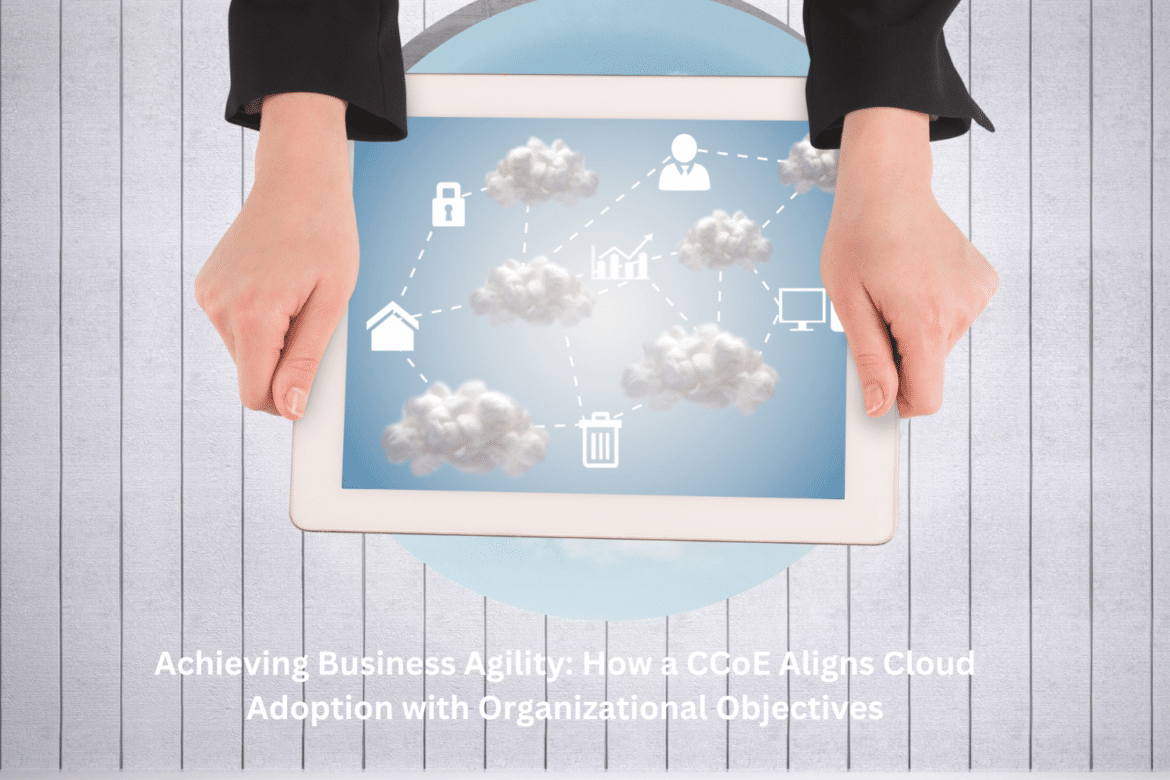Achieving Business Agility: How a CCoE Aligns Cloud Adoption with Organizational Objectives
In the modern business landscape, cloud adoption has become a critical driver of innovation, scalability, and operational efficiency. However, organizations often struggle to align their cloud strategies with tangible business outcomes, organizational capabilities, and governance frameworks. This is where a Cloud Center of Excellence (CCoE) plays a pivotal role. By bridging the gap between cloud adoption and enterprise objectives, a CCoE ensures that businesses can leverage the cloud effectively while maintaining control and compliance.
This guide explores how aligning cloud adoption with business goals through a CCoE can empower organizations to achieve long-term success.
Understanding the Role of a Cloud Center of Excellence (CCoE)
A Cloud Center of Excellence (CCoE) is a cross-functional team responsible for establishing and managing cloud best practices, driving standardization, and ensuring alignment with business objectives. It serves as the central authority for cloud strategy, governance, and operational execution within an organization.
Key Responsibilities of a CCoE:
- Developing cloud adoption frameworks aligned with business goals.
- Establishing governance policies for security, compliance, and cost management.
- Promoting cloud best practices across teams and departments.
- Driving innovation by leveraging cloud-native tools and technologies.
- Monitoring and optimizing cloud performance and costs.
Aligning Cloud Adoption with Business Outcomes
Cloud adoption should not be an isolated IT initiative; it must directly contribute to achieving business objectives. Here’s how organizations can ensure alignment:
1. Defining Business Objectives
- Identify key goals such as improving customer experience, increasing operational efficiency, or accelerating time-to-market.
- Collaborate with stakeholders across departments to understand their specific needs.
2. Mapping Cloud Capabilities to Outcomes
- Determine which cloud services and solutions best support your objectives. For example:
- Scalability: Use auto-scaling features to handle varying workloads.
- Data Analytics: Leverage cloud-based analytics tools for actionable insights.
- Global Reach: Deploy applications closer to users with multi-region hosting.
3. Establishing Metrics for Success
- Define Key Performance Indicators (KPIs) to measure the impact of cloud initiatives. Examples include:
- Reduced operational costs
- Improved application performance
- Enhanced customer satisfaction scores
Building Organizational Capabilities for Cloud Success
Successful cloud adoption requires a combination of technical expertise, cultural readiness, and operational maturity. A CCoE can facilitate this by:
1. Upskilling Teams
- Provide training on cloud platforms, tools, and best practices.
- Encourage certifications in AWS, Azure, Google Cloud, and other technologies.
2. Promoting Collaboration
- Break down silos between IT, DevOps, and business teams.
- Implement agile methodologies to foster faster decision-making and delivery.
3. Enhancing Operational Readiness
- Adopt automation for deployment, monitoring, and incident management.
- Standardize processes and workflows to ensure consistency across projects.
Implementing Governance through a CCoE
Governance is a critical aspect of cloud adoption, ensuring security, compliance, and cost management. A CCoE establishes governance policies that:
1. Ensure Security and Compliance
- Implement Identity and Access Management (IAM) policies to control access.
- Use encryption and data protection measures to safeguard sensitive information.
- Regularly audit cloud environments for compliance with industry standards.
2. Optimize Costs
- Monitor cloud usage to identify and eliminate waste.
- Use cost-management tools to forecast and control spending.
- Implement tagging policies for better resource tracking and allocation.
3. Standardize Cloud Operations
- Create templates and blueprints for consistent deployments.
- Use Infrastructure as Code (IaC) tools like Terraform or AWS CloudFormation.
- Enforce policies for resource provisioning and configuration.
Benefits of Aligning Cloud Adoption with Business Outcomes through a CCoE
Aligning cloud adoption with business outcomes through a Cloud Center of Excellence (CCoE) ensures that cloud strategies are not just about technology but also about driving measurable business value. A CCoE creates a centralized framework to align cloud initiatives with organizational goals, promoting consistency, efficiency, and innovation. By focusing on governance, cost optimization, and streamlined operations, a CCoE empowers businesses to leverage the cloud effectively, enabling faster time-to-market, improved collaboration, and a competitive edge in an ever-evolving market.
- Improved ROI: By aligning cloud initiatives with business objectives, organizations can maximize the return on their cloud investments.
- Enhanced Agility: A CCoE fosters agility by promoting faster decision-making and reducing time-to-market.
- Stronger Governance: Standardized policies ensure compliance and minimize risks.
- Optimized Costs: Effective cost management prevents overspending and improves resource utilization.
- Increased Innovation: A CCoE empowers teams to experiment with cloud-native technologies and deliver innovative solutions.
Conclusion
Cloud adoption is no longer optional for businesses aiming to remain competitive in a rapidly evolving digital landscape. However, the true value of the cloud can only be realized when it is aligned with business outcomes, supported by organizational capabilities, and governed effectively. A Cloud Center of Excellence (CCoE) serves as the linchpin in achieving this alignment, ensuring that cloud strategies are not only efficient but also impactful.
At Synergy IT Solutions, we specialize in helping businesses establish and optimize their Cloud Centers of Excellence. Our experts provide end-to-end support, from defining cloud strategies to implementing governance frameworks tailored to your unique needs. Partner with us to unlock the full potential of your cloud investments and drive meaningful business outcomes. Contact us today to learn more about our cloud solutions.
Contact :
Synergy IT solutions Group
439 University Avenue, 5th Floor
Toronto, ON M5G 1Y8
+1(866) 966–8311
+1(905) 502–5955
Email :
info@synergyit.ca
sales@synergyit.ca
Website :
https://www.synergyit.ca/

Comments
Post a Comment